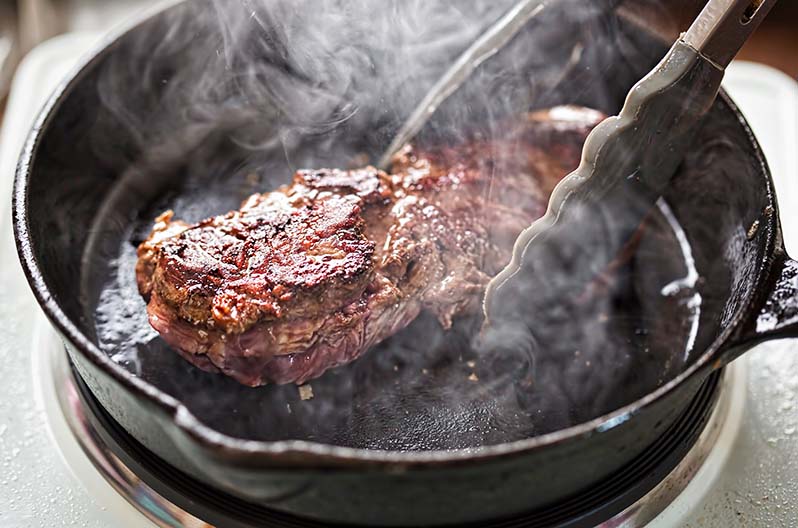Do you have sticky, greasy stains in your kitchen? Does your kitchen smell like grease or rancid meat? These are the two most common signs of protein fires. Even if you didn’t see flames, grilling, charring, or sauteing food can produce a fine mist of soot and grease. Over time, it will leave a sticky coating on kitchen surfaces and cause lingering greasy smells. From what causes them to how to clean after a protein fire, we look at ways to get rid of that greasy build-up and keep your kitchen smelling fresh.
What Is a Protein Fire?
A protein fire is when you burn high-protein foods like meat, fish, poultry, and eggs. Most people have never heard of protein fires because they don’t always have significant flames or heavy smoke. However, it’s actually one of the most common kitchen fires.
Protein fires often occur when frying, grilling, or sauteing, but they may happen any time you cook high-protein foods. Cooking releases proteins, oil, and soot that can leave a fine mist on surfaces throughout the kitchen. This protein mist will build up over time and leave thick grease stains on your walls and cabinets.
What Are the Signs of a Protein Fire?
The signs of protein fires are most apparent after burning food, but the damage will build up over time.
- Persistent meat or grease smells that become rancid over time
- Sticky surfaces that are nearly impossible to clean
- Yellowish to brown stains that form drip-like patterns
- Brown or black soot stain that seems to appear after cooking
Are Protein Fires Harmful?
While there are no health risks, protein fires can damage your home. The grease and protein ash will coat walls and cabinets, leaving a stain. Without regular cleaning, it can form a thick resin stain.
Eventually, the stains from protein fires will lead to harmful damage to your home. It can peel paint and wallpaper and weaken your walls. The grease can permanently stain or even etch your cabinets, causing the veneer to crack and flake.
It can also lead to greasy or oily smells in the kitchen. In time, they can even smell like rotten meat or spoiled milk. Since these smells soak in, replacing your walls or cabinets is the only way to get rid of them.
Why Cleaning up a Protein Fire Is Difficult
While you will notice burned food, it is easy to overlook the risk of protein fires because of the lack of flames and heavy smoke. As a result, the grease and soot residue of protein fires often go unnoticed for weeks or even months. Even if there is a significant flair-up or smoke, the risk of protein fires goes overlooked unless there is flame damage.
The grease and soot will build up over time and lead to yellowish-brown stains and rancid, meaty odors. By the time you see or smell the signs of a protein fire, the stains are set in and difficult to clean.
The grease not only seeps into porous surfaces but also discolors most surfaces. The grease, soot, and other dirt and dust create a sticky layer that most regular cleaners cannot cut through. Protein fire stains and smells will remain even with repeated cleaning and deodorizing.
How to Clean After a Protein Fire?
The most effective way to clean after a protein fire is to clean up before soot and grease build-up. Clean your cooktop and cabinets with vinegar and liquid dish soap every time you cook. Wipe down your cabinets, especially the bottoms, and clean your floors every few weeks. Then clean the walls and the tops of your cabinets every month or so.
To deodorize, sprinkle baking soda on surfaces, then wipe clean with a damp rag an hour later. You can also put out jars of chunk charcoal or leftover coffee grounds to naturally absorb the smell. Boil the chunk of charcoal in water for ten minutes every two weeks, and they will last a year. When using coffee grounds, compost or dispose of them every day.
Set-in protein fire stains are more difficult to clean. Make a paste with baking soda and white vinegar and allow the bubbling action to loosen the grease. Then scrub the area with vinegar and dish soap. It can take several cleanings to remove stubborn stains.
You can clean rancid or smokey odors with equal parts of white vinegar and warm water. Mix up small batches and scrub small areas at a time for the best results. Repeat as necessary until the odors are gone. Contact a fire damage restoration company if you cannot remove odors from protein fires.
Do you have protein fire stains, smokey odors, or soot tags after a kitchen fire? Let our experts clean up and restore your home fast. Call 877-941-2788 now for a free quote and fast, reliable service.





